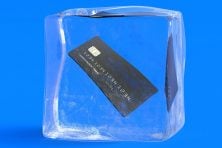Put Away the Plastic? 4 Ways an Unused Credit Card Could Still Hurt You

If you aren’t using your credit card, the whole “out of sight, out of mind” thing could keep you from spending money, However, it still could land you in financial trouble — think lower credit score due to inactivity and potential fraud.
To protect yourself, watch out for these potential consequences of an unused credit card.
4 Ways an Unused Credit Card Could Hurt Your Finances
While paying down balances is a good thing, an idle account isn’t.
These four financial pitfalls come with not using your credit card. We’ll explain how to manage them.
1. It Could Affect Your Credit Score
If you put your credit card on ice but you’re still carrying a balance, you should continue making monthly payments. If you pay it off, you have good reason to celebrate. Just do so responsibly (aka don’t put a huge expense on your card that lands you back in debt). Then keep using your card.
Continuing to use your card is important if you rely on it to build your credit score. Maintaining a responsible spending and payment schedule — rather than closing the account — affects three of the five factors that determine your credit score:
- Payment history, which counts for 35% of your score.
- Credit utilization, which counts for 30%.
- Length of credit history, which counts for 15%.
Keeping a credit line open contributes to your credit history, but it can have an even bigger impact on your credit utilization — the percentage of available credit you’re using.
For example, let’s say you have two credit cards each with $1,000 credit limits. You pay off one but still have a $300 balance on the other. If you keep both cards open, your credit utilization rate would be 15%. But if you close the credit card you paid off, your credit utilization would shoot up to 30%. The higher the utilization, the more it negatively affects your credit score.
But even if you don’t plan to close your credit card accounts, dumping all your cards in a drawer because you don’t need them could affect your credit payment history — also a big contributor to your credit score.
Keep manageable monthly subscriptions on your credit cards — think Netflix or Spotify — that you can commit to paying off every month. The amount you’re paying off doesn’t matter when it comes to your credit score — what does matter is that you’re paying off the balance each month on time.
2. Your Credit Limit Could Be Slashed
During times of economic uncertainty, credit card companies may slash cardholders’ credit limit to protect against debt consumers can’t afford to pay back.
It happened during the start of the COVID-19 pandemic, and according to a report by the Consumer Financial Protection Bureau, a decreased credit limit can have devastating effects.
“Reduction in the available line on a credit card will drive up the utilization rate for that card, even if the consumer maintains an identical balance,” the report found. “Increasing overall consumer utilization may cause lenders to view the consumer as a higher credit risk… and may make it harder to access credit.”
That reduction could come at your expense — and in an unexpected way if you don’t monitor your credit limit regularly:
- If you attempt to charge an item that exceeds your new credit limit, you could get socked with over-the-limit charges.
- Your credit score could take a hit if the lower limit increases your credit utilization ratio.
By scanning your credit card statement every month or going online to check your limit, you can avoid getting hit with over-the-limit fees if your credit limit is lowered.
And if you do notice a credit limit decrease, here are four ways to fix it.
3. Or, Your Card Could Be Closed Altogether
Your credit card company can choose to close your account if you don’t use it — with or without warning.
There’s no set amount of time that would cause a closure, according to Experian, but multiple months of inactivity may trigger a closure. Credit card closures can make your credit score dip. This is because you now have a lower overall credit limit, which leads to higher utilization.
Using the card for manageable monthly subscriptions can help with this as well.
4. You Could Be a Fraud Victim Without Knowing It
Personal story: I have four credit cards, but I use only one regularly. Every week, I check in with my cards’ apps for recent transactions.
Recently, one of my cards showed two charges, for a gas station and fast-food restaurant. Neither would have raised suspicion from my card issuer, but because I knew that card was safely tucked away, I could immediately report the card stolen.
If I had simply assumed that my cards were safe because I wasn’t using them, I could have wound up with a nasty surprise at the end of the month — or worse, if I hadn’t bothered to open my statement and gotten socked with late fees.
Moral of the story: Even if you aren’t using them, check in with your credit card accounts regularly to prevent fraud and theft.
If you haven’t been using your card the past couple of months — or you have avoided looking at the balance — you may not be monitoring transactions as closely.
By downloading the official apps for each of your cards, you’ll have immediate access to your card information, including the customer service contact, as well as tiny reminders of the cards that may not be in your wallet but still need your attention.
Tiffany Wendeln Connors is deputy editor at The Penny Hoarder. Rachel Christian, a senior writer at The Penny Hoarder, contributed.


















